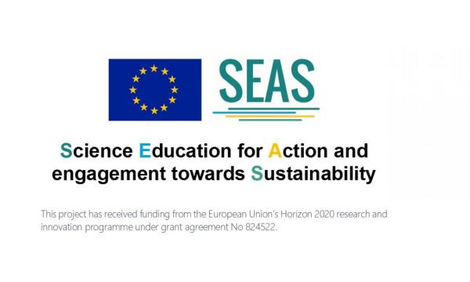Swafs - SEAS
Introduction

Project description
Technological, socio-economical, and environmental changes are rapidly transforming and posing new challenges to our societies. What scientific knowledge, literacies, and skills do students and citizens need to address these challenges? Through SEAS, we will develop tools and methods that facilitate collaboration between schools and local communities facing sustainability challenges through what we call “open schooling”.
Open schooling involves schools cooperating with other institutions and organizations to achieve community well-being and changes the way science comes into the classroom and how the science-classroom makes a difference in the world. In SEAS, this entails creating collaboration tools and methods where teachers and students can work together with out-of-school partners on solving sustainability and social justice challenges in their local communities.
There is a need for supporting, accelerating and catalyzing the personal, social, and institutional changes necessary to make it possible for school and out-of-school institutions to initiate and maintain sustainable collaborations. In a context in which the role of science in democratic societies’ is being challenged, students, and citizens more generally, need to experience that they can use scientific knowledge for social purposes and become agents for change through collaboration. SEAS involves a collaborative design approach, which means that educators, students and their families, participate together with other actors in the local community to address real-life, complex sustainability challenges.
Ultimately, SEAS will develop models for open-schooling implementation that will support schools and out-of-school institutions to collaborate in the promotion of new forms of scientific literacy and skills that better reflect the social and inter-disciplinary nature of science, empowering students and citizens at large to become agents of change in a democratic society. Although SEAS takes the issue of sustainability as point of departure, the principles, models and tools developed will be of relevance for bringing closer school and society through other subjects and topics.
Objectives
These are the objectives of SEAS:
- Objective 1: Identifying core principles and best practices required for creating and sustaining open schooling collaborations.
- Objective 2: Promoting scientific literacies and skills necessary to engage in addressing real-life, complex sustainability challenges.
Role of Ghent University
Within SEAS, Ghent University coordinates an open schooling network that engages with the topic of sustainable cities and communities (Sustainable Development Goal 11). In this network, we support schools and environmental education (EE) centres to collaborate with local stakeholders to utilise local sustainability challenges as fruitful learning environments for fostering scientific literacy for sustainability citizenship. We focus in particular on a tool for collaborative planning of open schooling practices starting from locally relevant sustainability challenges, LORET – Locally Relevant Teaching. In a first phase (year 1-2) researchers from Ghent University collaborate with the government of Flanders (Eco-schools programme MOS) in some pilot schools and an environmental education (EE) centre. Within this local network, we directly involve the school teams, the educators of the EE centre, its visitors and the class groups that participate in EE programmes as well as local stakeholders (businesses, NGOs, policymakers, etc.) with whom the schools and centre collaborate. Together with the MOS coaches, the researchers support the schools and EE centre to identify and select locally relevant challenges to make their city and community more sustainable, connect them to the curriculum (learning objectives for diverse subjects as well as cross-curricular objectives) and co-create teaching and learning activities (lesson plans). In this densely populated region, issues such as affordable and sustainable housing, safe and sustainable transportation, sustainable urbanisation and spatial planning, air quality, waste management, green public spaces, sustainable food production and consumption, etc. are hot topics. Based on these pilots, SEAS’ tools and methods will be further tailored and fine-tuned in view of a broad, efficient dissemination throughout Flanders in phase 2 (year 3). An online manual, database and conference will facilitate the up-scaling of LORET-based open schooling in Flanders. UGent also coordinates WP5 – Global Assessment & Synthesis.
Website
Contact
Prof. Katrien Van Poeck
Department of Political Sciences
Phone number: +32 475 59 05 54
E-mail